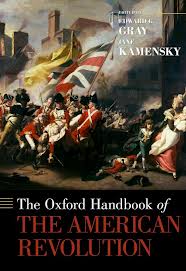The 2nd post in my 6 post series recapping the American Revolution Reborn Conference (Part 1: Opening Roundtable)
 Global Perspectives on the American Revolution
Global Perspectives on the American Revolution
Chair: Andrew O’Schaughnessy
Panelists
Kate Carte Engel (Southern Methodist University), “Transatlantic Protestantism and the Challenge of the Revolution”
Caitlin Fitz, “The United States in the Age of Revolutions: A Reconsideration”
Aaron Fogleman: “The Changing Nature of Transatlantic Migration in the Age of Revolution”
Ned Landsman: “British Union and American Revolution: Unions, Sovereignty, and the Multinational State”
Biggest Takeaway: Scholars should study the Revolution in a global context because it is useful to compare American experiences with those in Europe, Africa, the Caribbean, & South America.
Biggest Question: Should we expand our periodization of the American Revolution to cover the years 1760 to 1825?
Panel Summary
Engal advocated for more studies that use religion to understand the American Revolution. Up until now the story of the founding has been largely secular, but what happens if we look at the Revolution through the lens of Protestantism? What were the implications of the Revolution for religion?
Fitz would like to see the periodization of the Revolution expanded to 1775-1825. This periodization allows scholars to compare the American Revolution with Latin & South American revolutions. This comparison deepens our understanding of American republicanism and ways of thinking. As Latin & South American countries declared independence they passed legal measures that ended slavery and promoted racial equality. Americans followed these actions in newspapers and no one reacted because the distance of South America from the United States rendered South American events abstract concepts.
Fogleman has found that immigration throughout the Atlantic was much higher from 1777 on than previously expected. Fogleman does not believe in the notion that the Revolution secured slavery and increased racism. When Fogleman studied the American Revolution in the Atlantic context, he found that slavery declined from its 1760s numbers during and after the Revolution.
Landsman believes that American historians have not sufficiently attended to the British aspect of the British Empire. Imperial reformers looked at including the 13 colonies in the formal 1707 union, but by 1763 the Americans had so much sovereignty that the British had little left to give to make the union appealing, aside from the sovereignty of Parliament. Reformers discussed the idea of eventually moving the imperial capital to North America, but British officials were wary of making any concessions that might suggest that the imperial capital would move, especially when America seemed to be pursuing a Republican path.
Official Panel Commentary
Colley found that the panel provided 3 ways to look at how the American Revolution was a manifestation of trends going on around the world.
1. Landsman reminds us of the issues of sovereignty, empire, & union. C.A. Bailey referred to the post-1750 era as a global crisis when increasingly expensive warfare raised taxes and provoked discussions of governance and rebellion. We have seen this in North America in the wake of the Seven Years’ War, in the Spanish Empire, the Russian Empire, and even in parts of the Mogul Empire.
2. Fitz shows historians that we need to reexamine the umbrella term “Age of Revolution.” However, scholars can equally argue that the Age of Revolution was also an Age of Empire. The British Empire became reinvigorated by its defeat. New empires emerged, such as the Napoleonic, Brazillian, & new American empires.
3. To properly re-birth the American Revolution, both American and British historians need to stop behaving as though the links between their respective societies ended in 1783.
Countryman posited that when scholars look at colonial America they see neo-Europes. However, colonial America had more going on than European settlement. Neo-Europes had a lot of Africans and scholars need to look beyond the neo-Europes to study those Africans. Contestation between European and Native American claimants of North America defines a colonial order that was not just an extension of European order. Countryman also believes that the biggest change wrought by the Revolution was the entry of the young United States into the Westphalian state system.
Heyrman believes that Protestant Nationalism & Internationalism peaked together just after the Revolution. Immigration from Ireland and elsewhere caused the remolding of Protestantism around the Atlantic and animus to Catholicism emerged as a necessary aspect of Protestantism.
Sampling of Question & Answer Remarks
Fogleman argued that slavery experienced the most security before the Revolution. The Revolution created a problem for slavery as it pointed towards emancipation. After the Revolution, slaveholders had to argue the positive good of slavery because others argued that slavery was bad.
Engal believes that scholars should shrink the Revolutionary period to 1763-1792 or 1774-1792. This periodization would allow historians to focus on what really happened during the war without having to study how a particular aspect of the Revolution played out over time. Expanding the Revolutionary periodization is also important, but the two goals should be separate: One group should look at the war and a second group should see how the Revolution played out.
Fogleman: The Revolution was not particularly religious in its causes, but the Revolution happened to a religious people. Americans' religion effected the way they viewed the Revolution and this should be studied.
Tomorrow: Recap of the American Revolution as Civil War
Feel free to agree or engage with the points and questions raised by this conference by leaving a comment.







